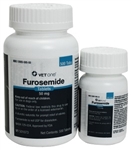


Furosemide Tablets are indicated for the treatment of edema (pulmonary congestion, ascites) associated with cardiac insufficiency and acute noninflammatory tissue edema. In cases of edema involving cardiac insufficiency, the continued use of heart stimulants such as digitalis or its glycosides is indicated. The rationale for efficacious use of diuretic therapy is determined by the clinical pathology producing the edema.
Dosage and Administration: The usual oral dosage of Disal Tablets is 1 to 2 mg/lb body weight (approximately 2.5 to 5 mg/kg). A prompt diuresis usually ensues from the initial treatment.
Administer orally once or twice daily at 6 to 8 hour intervals. The dosage should be adjusted to the individual's response. In severe edematous or refractory cases, the dose may be doubled or increased by increments of 1.0 mg per pound of body weight. The established effective dose should be administered once or twice daily. The daily schedule of administration can be timed to control the period of micturition for the convenience of the client or veterinarian. Mobilization of the edema may be most efficiently and safely accomplished by utilizing an intermittent daily dose schedule, i.e., every other day or 2 to 4 consecutive days weekly.
Diuretic therapy should be discontinued after reduction of the edema, or maintained after determining a carefully programmed dosage schedule to prevent recurrence of edema. For long-term treatment, the dose can generally be lowered after the edema has once been reduced. Re-examination and consultations with the client will enhance the establishment of a satisfactory dosage schedule. Clinical examination and serum BUN, CO2 and electrolyte determinations should be performed during the early period of therapy and periodically thereafter, especially in refractory cases. Abnormalities should be corrected or the drug temporarily withdrawn.
Dosage: Oral
Dog: One-half to one 50 mg scored tablet per 25 pounds body weight. One 12.5 mg scored tablet per 5 to 10 pounds body weight.
Administer once or twice daily, permitting a 6- to 8-hour interval between treatments. In refractory or severe edematous cases, the dosage may be doubled or increased by increments of 1 mg per pound body weight as recommended.
Cat: 1 to 4 mg/kg [1/2 to 2 mg/lb] every 8-24 hours orally.
Contraindications: Animal reproductive studies have shown that furosemide may cause fetal abnormality and the drug is contraindicated in pregnant animals. Furosemide is contraindicated in anuria, furosemide hypersensitivity, hepatic coma, or during electrolytic imbalances. Monitor serum electrolytes, BUN and CO2frequently. Monitor serum potassium levels and watch for signs of hypocalcemia.
Corticosteroids cause an additive potassium-depletion effect.
Precautions: Disal Tablets are a highly effective diuretic-saluretic which, if given in excessive amounts, may result in dehydration and electrolyte imbalance. Therefore, the dosage and schedule may have to be adjusted to the patient's needs. The animal should be observed for early signs of electrolyte imbalance, and corrective measures administered. Early signs of electrolyte imbalance are increased thirst, lethargy, drowsiness or restlessness, fatigue, oliguria, gastro-intestinal disturbances and tachycardia. Special attention should be given to potassium levels. Disal Tablets may lower serum calcium levels and cause tetany in rare cases of animals having an existing hypocalcemic tendency.7 8 9 10 11
Furosemide Tablets are contraindicated in anuria. Therapy should be discontinued in cases of progressive renal disease if increasing azotemia and oliguria occur during the treatment. Sudden alterations of fluid and electrolyte imbalance in an animal with cirrhosis may precipitate hepatic coma, therefore observation during period of therapy is necessary. In hepatic coma and in states of electrolyte depletion, therapy should not be instituted until the basic condition is improved or corrected. Potassium supplementation may be necessary in cases routinely treated with potassium-depleting steroids. Active or latent diabetes may on rare occasions be exacerbated by furosemide. Transient loss of auditory capacity has been experimentally produced in cats following intravenous injections of excessive doses of furosemide at a very rapid rate.
Warnings: Furosemide Tablets are a highly effective diuretic and, if given in excessive amounts, as with any diuretic, may lead to excessive diuresis which could result in electrolyte imbalance, dehydration and reduction of plasma volume, enhancing the risk of circulatory collapse, thrombosis and embolism. Therefore, the animal should be observed for early signs of fluid depletion with electrolyte imbalance, and corrective measures administered. Excessive loss of potassium in patients receiving digitalis or its glycosides may precipitate digitalis toxicity. Caution should be exercised in animals administered potassium-depleting steroids. Correct potassium deficiency with proper dietary supplementation. If animal needs potassium supplements, use oral liquid form, do not use enteric-coated potassium tablets.
The concurrent use of furosemide with some antibiotics may be inadvisable. There is evidence that the drug enhances the nephrotoxic potential of aminoglycosides, cephalosporins and polymyxins and increases the ototoxic effects of all aminoglycosides.
Sulfonamide diuretics have been reported to decrease arterial responsiveness to pressor amines and to enhance the effect of tubocurarine. Caution should be exercised in administering curare or its derivatives to patients undergoing therapy with Disal Tablets and it is advisable to discontinue Disal Tablets for one day prior to any elective surgery.
Additional information not available for this medicine.